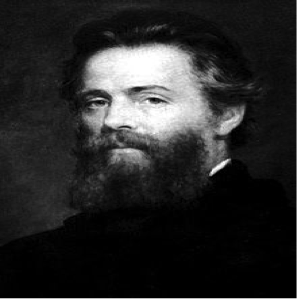 American novelist, short story writer and poet Herman Melville is probably best known for his novel Moby Dick, the most famous of his accounts of life at sea. The majority of his writing was done in his younger years and his work was largely forgotten until long after his death.
American novelist, short story writer and poet Herman Melville is probably best known for his novel Moby Dick, the most famous of his accounts of life at sea. The majority of his writing was done in his younger years and his work was largely forgotten until long after his death.
Melville was born in New York City, August 1st 1819, the third child of eight siblings. His parents were Allan and Maria Gansevoort whose ancestors had been Scottish and Dutch settlers in New York City. One grandfather had been a member of the Boston Tea Party of 1773. As a boy Melville’s father thought him:

The family fell on hard times when Allan Melville died in 1832 but Herman and his eldest brother were able to hold on to the family business and Herman attended Albany Classical School in 1835, then became a teacher for a short spell.
Having already tried a variety of jobs including teaching, surveying and clerical work Melville joined his first whaling ship in 1840, the beginning of a fruitful relationship with the sea. However after 18 months he jumped ship to live among the French Polynesian Marquesas Islands inhabitants. His experiences here formed the basis of his first novel, Typee. Although the Typee people were reputed to be cannibals Melville gave a romanticized account of, as he saw it, an idyllic sanctuary, even though he was actually a ‘guest-captive’. A second novel, Omoo, chronicled his adventures following the mutiny from the whaling ship which had landed him in jail in Tahiti.
Once back home Melville found that his books were well-received and this encouraged him in his efforts. When his eldest brother died Herman became head of the household and he determined to write enough to make money to support his family. In 1847 he married Elizabeth Shaw and tried, unsuccessfully, to gain conventional employment. He wrote literary reviews for journals and became the darling of the New York City literary set, who regarded him almost as a character in one of his own books, one writer describing him as:

Melville had begun his third book, Mardi, which he tried to write in a different way from the first two; however it was much criticized as incomprehensible and seemed to be a mish-mash of styles. He quickly wrote two further novels in the style of the first two to please his publishers and readers. Melville perhaps alluded to this disappointment when he said:

Melville began writing poetry in the 1860s while working as a New York Customs Inspector but his early efforts attracted no interest. He persevered however, and published a volume of poems entitled Battle Pieces and Aspects of the War, about the American Civil War, a subject which occupied most of his poetry. The writing was considered by many to be flowery and too ambitious and Melville remained unacknowledged as a poet. Here is an extract from his poem America:

Herman Melville died of a heart attack at the age of 72 on September 29th 1891, his talent completely forgotten. But by the 1920s he began to gain recognition as one of America’s greatest writers.

